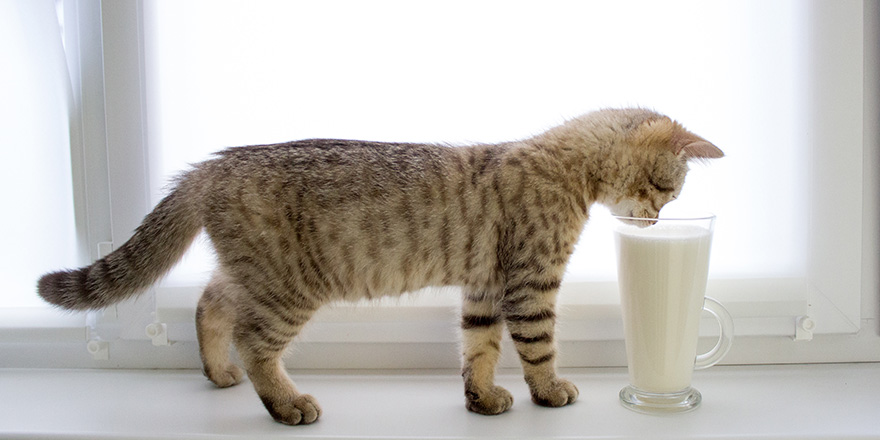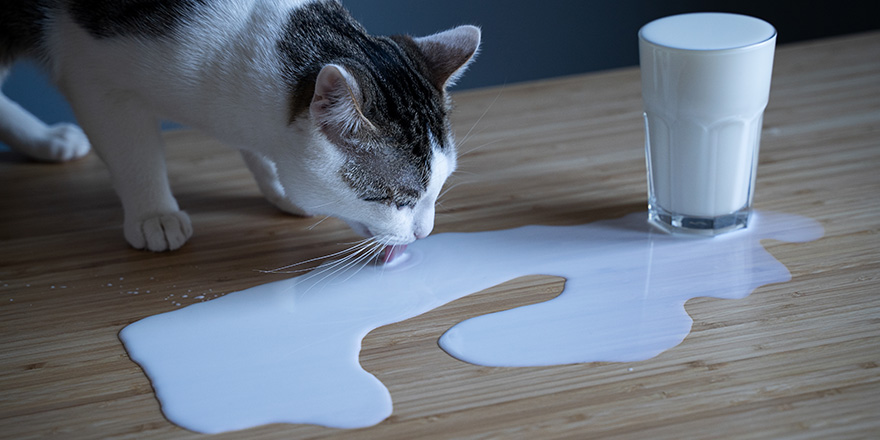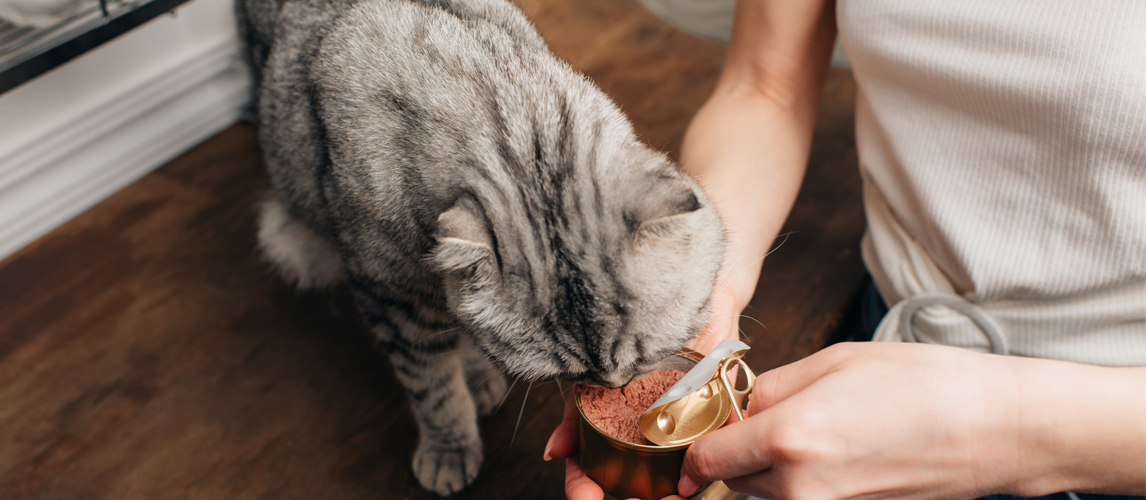Many cat owners find themselves on the lookout for healthier dairy-free alternatives for their feline friends. You may have been advised in the past to avoid giving cow’s milk to your cat, but want to find something along similar lines that could serve as a delicious dairy-like treat once in a while. But many people are unsure as to what alternatives are actually suitable for cat consumption, so we’re going to take a closer look and answer the question of whether cats can drink almond milk, to save you the hassle of hunting for answers.
Can Cats Drink Almond Milk?
In essence, yes. Cats are capable of drinking almond milk as an alternative to cow’s milk, seeing as almond nuts are not dangerous to cats. However, this does not guarantee that your cat will be able to process almond milk easily. In fact, cats and dogs are naturally lactose intolerant and are not designed to process any other milk but the milk of their mothers. Therefore feeding your cat milk alternatives can lead to an upset stomach – especially if you are giving it to them regularly.
Sweetened or Unsweetened?
It is better to stick with unsweetened where possible because sweetened almond milk usually contains artificial sugars and flavorings that can trigger an upset stomach. Even though cats love milk of all kinds, you should be especially careful to use the most natural form of the product if you are planning on feeding almond milk to your cat.

How Much Almond Milk Is Acceptable For Cats?
Too much almond milk can result in digestive distress. Therefore it is recommended that you only give cats almond milk as an occasional treat, and not as part of a regular diet. Ideally, you should aim to give them almond milk once every couple of weeks to give them time to digest it properly. Additionally, you should keep the portion sizes small, giving them no more than half a cup of almond milk at any one time. This is because almond milk is high-calorie and can throw off your cat’s diet if they’re given too much.
Health Benefits of Almond Milk
Adult cats are able to take several health benefits from almond milk which can aid in their overall development of our furry friends.
Healthy Fats
Almonds are naturally rich in healthy fat, hence their use as a way to introduce fat into a healthy diet. Therefore, almond milk is a natural source of fat that is not nearly as difficult to break down as saturated fat.
Vitamin E
Vitamin E helps to maintain healthy vision, and skin as well as assists with healthy reproduction.
Vitamin D
Vitamin D promoted dental and skeletal health as well as supports the immune system, brain, and nervous system of your little furry friend. Vitamin D can also help to reduce the risk of heart disease by lowering blood pressure.
Vitamin A
Vitamin A is particularly helpful for protecting your cat’s vision, strengthening their immune system, and promoting healthy growth and reproduction.
The Negatives of Almond Milk
Even though almond milk does have its benefits and can be considered a healthier alternative to dairy products and regular milk, it does also have its downside.
Low Calcium Levels
Though almond milk does contain calcium, the amount is significantly lower than the calcium levels in dairy products.
Can Cause Digestive Distress
Due to the cat’s inability to easily break down some of the sugars in almond milk and the high-fat content, it is common for almost milk to trigger bloating, gas, and loose stools if cats are given it too often.
Excess Calories
Though almond milk is lactose-free, it does contain certain sugars and saturated fat which can lead to excessive weight gain. Just one cup of almond milk typically contains around 100 calories. Most cats are recommended to have between 200-400 calories a day depending on their size, and so even though the nutritional benefits of almond milk may seem like a big positive, you need to take into account that even though some may consider it a healthy alternative. Too much almond milk would throw off your cat’s daily calorie count if used alongside their usual cat food.
What Kind of Milk Can Cats Drink?
There are quite a few milk options out there for cats, though each has its own pros and cons.
Cow’s Milk
It is possible for cats to have cow milk, although, they do lack the required enzyme (lactase enzyme) to be able to digest lactose easily process dairy milk once it has been consumed. As a result, you may find that your cat exhibits the signs of lactose intolerance if they drink cow’s milk regularly (or any animal milk really).
Soy Milk
Soy milk contains stachyose and raffinose sugars. These can be particularly difficult for a cat to break down, though not toxic or lethal. Much like any milk really, your cat may have a hard time digesting this on a regular basis. However, it can be a very tasty treat on rare occasions, just don’t overdo it and watch for any signs of discomfort following consumption.
Coconut Milk
Much like the other daily alternatives on our list, coconut does have several nutritional benefits and is particularly good at helping to care for your cat’s skin and coat. However, it’s also got a high-calorie content and can be quite fatty and sugary, which can lead to stomach upset.
Rice Milk
Probably the least recommended on our list owing to the lack of nutritional value in rice milk when compared to other options. If you’re wanting to give your cat a little taste of something different, but you’re not worried about nutrients per se, then this is definitely an option. Though once again, be mindful of how much they drink.

When to Seek Veterinary Advice
If your cat starts to have a bad reaction to almond milk, we would highly recommend that pet owners contact a veterinarian immediately for advice on how to proceed. Almond milk is not recommended for diabetic cats as it can raise their blood sugar levels quite quickly. Your cat might have food allergies that include almonds, or could be severely lactose intolerant and struggle more than other cats to digest it. The following symptoms will indicate that your cat may need medical help:
- Persistent vomiting
- Scratching at their head and neck
- Itchy or runny eyes
- Severe bloating
- Diarrhea
- Sneezing and coughing
- Hot spots
- Excessive grooming
- Hair loss or thin patches
- Difficulty breathing
- Lethargy
- Red sensitive irritated ears
Sources:
FAQs:
If you're thinking of giving your cat almond milk you should try to stick with unsweetened almond milk as opposed to sweetened. The more natural the product, the more easily your cat will be able to process it. Sweetened almond milk often contains artificial sweeteners and flavorings that can make your cat ill if they have too much.
Cats can drink almond milk without any real problems. However, regular consumption of almond milk can lead to a stomach ache. This is because your little feline friend is not getting enough time to process the milk in between drinks.
No. This is not because almond milk is toxic or damaging to kittens, but because kittens have extremely sensitive stomachs until they are fully weaned and developed. Therefore a growing kitten is likely to struggle more than an adult cat with the digestion of any milk other than cat's milk. Wait until they are at least a year old before offering your kitten almond milk.
Try to limit giving your cat almond milk to one every couple of weeks at the most. Giving almond milk to your cat is fine as a rare treat, as the creamy texture, nutty flavor, and nutritional value of almond milk are both enjoyable and beneficial in small doses. But overdoing it can cause unwanted weight gain and upset your cat's digestive tract.







